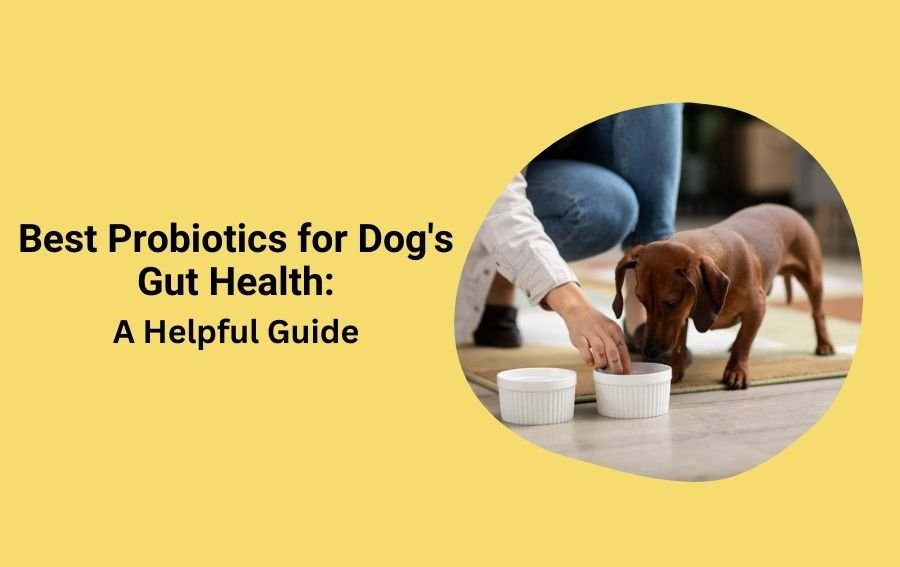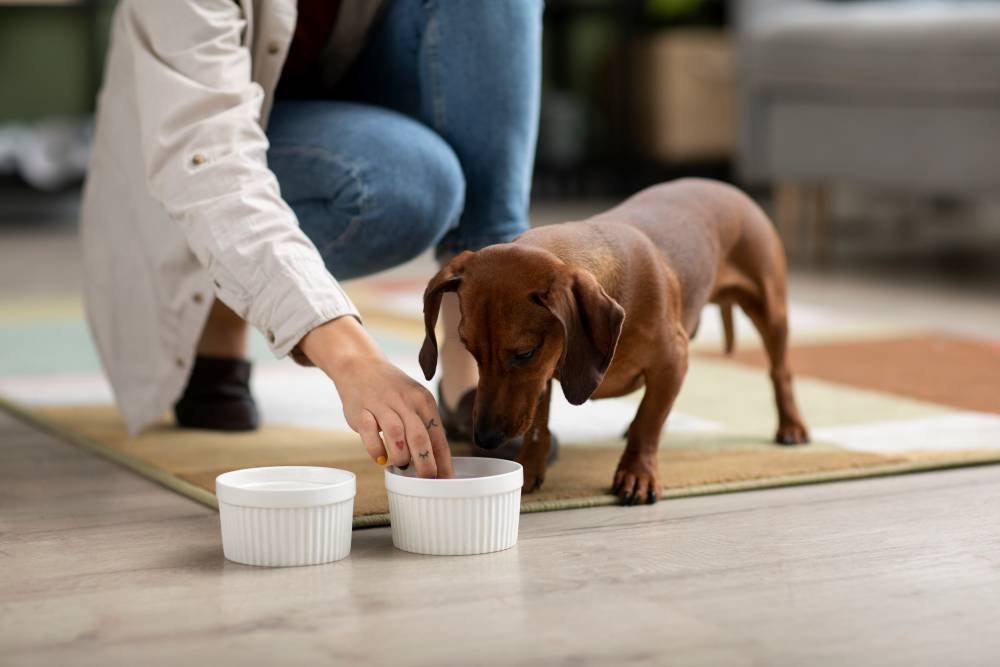Probiotics are essential for improving your dog’s health. These good bacteria help balance the gut, support digestion, and improve the skin and coat. However, choosing the right probiotic can feel overwhelming with so many options.
Not all dog probiotics are the same, so it’s important to understand the differences. Factors like choosing the right strains, ensuring quality, and correct dosage all play a role. This blog will help you find the best probiotic to boost your dog’s gut health and overall well-being.

The following are the sections covered in this guide. Feel free to click any link to get right to that subject.
- Why Gut Health Matters for Dogs
- What Are Probiotics for Dogs?
- When Your Dog Needs Probiotics
- Types of Probiotics for Dogs
- Benefits of Using Probiotics for Dogs
- How to Choose the Best Probiotic for Your Dog?
- What to Look for in a Good Probiotic Supplement?
- Natural Sources of Probiotics for Dogs
- Potential Side Effects of Probiotics
- When to Avoid Giving Probiotics to Your Dog
- How to Introduce Probiotics to Your Dog’s Diet?
- How Long Does It Take for Probiotics to Work?
- Final Paw
- FAQs
Why Gut Health Matters for Dogs
The gut of your dog is a very important part of its body. It has billions of both good and bad bacteria. An unbalanced gut can cause diarrhea and a weak immune system. These products help prevent problems and restore your dog’s gut balance.
What Are Probiotics for Dogs?
Probiotics are live, good bacteria that help with digestion. Further, they help your dog’s gut work well, reduce bacteria, and improve digestion. Also, it can help with immunity and behavior issues similar to the benefits of vet-approved dog food that can enhance your dog’s overall health..
When Your Dog Needs Probiotics
Your dog may need probiotics if showing symptoms like:
- Firstly, stomach problems like diarrhea, constipation, or gas.
- Secondly, skin problems like itching or allergies.
- Thirdly, behavior changes like being tired or irritable.
Types of Probiotics for Dogs
Many types of probiotics include several strains of bacteria that have different effects. These include:
- Lactobacillus: Helps break down food for easier digestion.
- Bifidobacterium: Lowers inflammation, boosts immunity, and supports gut health
- Enterococcus: Prevents diarrhea since it has some properties that help maintain good flora in our intestines.
Benefits of Using Probiotics for Dogs
There are many benefits that probiotics can offer for the health of your dog. Above all, they also help with gas, bloating, and diarrhea. They also improve skin, such as allergies that may be happening at home, and bring a shine of health to the fur of your dog, too. A bland diet can also help to manage digestive health and soothe upset stomachs.
How to Choose the Best Probiotic for Your Dog?
There are a few things to think about when choosing a probiotic.
- Quality: Make sure the product has good, quality, non-tainted ingredients.
- Strain Selection: Choose probiotics with proven strains like Lactobacillus or Bifidobacterium.
- Dosage: Follow the instructions, as the amount depends on your dog’s size and weight.
What to Look for in a Good Probiotic Supplement?
When you buy probiotics, look at the CFU count to see how many live bacteria are in the item. Aim for at least 1 billion CFUs. Make sure you store them properly so they keep working, and choose packaging that keeps them fresh. Always pick probiotics that your vet says are okay.
Natural Sources of Probiotics for Dogs
Some pet owners prefer to add natural probiotic sources to their dog’s diet. A few options include:
- Yogurt: First, Unsweetened yogurt is a great source of live bacteria.
- Fermented Vegetables: Rich in probiotics, but not always a favorite.
- Goat’s Milk: Third, goat’s milk is easily digestible and full of healthy bacteria for gut support.
Potential Side Effects of Probiotics
Most dogs handle probiotics well, but mild side effects can occur, such as:
- Gas and Bloating: It may happen during the first few days of use.
- Allergic Reactions: Some dogs may have rare reactions. So keep an eye out for any unusual symptoms.
When to Avoid Giving Probiotics to Your Dog

Probiotics are safe but might not be right in some cases. Moreover, If your dog has health issues or is older, be more careful with probiotics. Further, ask your vet before giving new supplements, especially if your dog has health problems. If you’re unsure, you can easily access online vet services through our website to get expert advice for your dog.
How to Introduce Probiotics to Your Dog’s Diet?
Regularly using probiotics will greatly help reduce any side effects associated with their use. Start with a little portion, then add more depending on how much your dog can handle. Additionally, dosage depends on your dog’s weight, and you should watch how they react.
Comparison of Common Dog Probiotic Strains
| Probiotic Strain | Key Benefit | Common Source |
| Lactobacillus | Aids digestion | Yogurt, supplements |
| Bifidobacterium | Supports immune health | Fermented foods |
| Enterococcus | Prevents diarrhea | Probiotic capsules |
How Long Does It Take for Probiotics to Work?
Probiotics work differently based on your dog’s needs. You may see better digestion in a few days, but it can take weeks to see changes in immunity or skin.
Final Paw
In summary, probiotics help support your dog’s gut health. All in all, a probiotic diet will help digest lactose or boost their immune system. Knowing the various strains and their benefits along with consulting your vet. Also, it will help you choose the best option for your dog’s needs.
FAQs
Q1. What are the best probiotics for dogs?
Dog probiotics contain strains, such as Lactobacillus and Bifidobacterium, which enhance digestion and the immune system.
Q2. How often should I give probiotics to my dog?
Probiotics could be fed daily; however, that will depend on the specific product and recommendation from the vet.
Q3. Can I give my dog human probiotics?
It’s best to use probiotics specifically designed for dogs, as they contain strains most suitable for their GI tract.
Q4. Are probiotics safe for puppies?
Probiotics are safe for puppies. But if your dog has health issues or is older, be more cautious.







